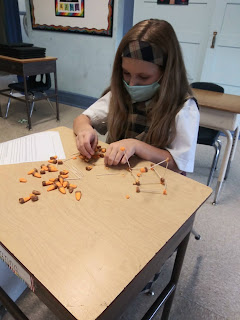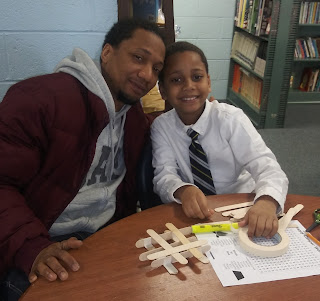This STEM challenge was to build a model of an igloo. We started off talking about snow-covered areas like Alaska, parts of Canada and even northern parts of the United States. Then we discussed what igloos are made of and watched a video online about how they are built. Students used a lab sheet to sketch a plan before beginning. Then
they used paper plates, cotton balls, paper towel rolls and glue to build a circular based, dome shaped igloo with a door opening. Everyone was successful and had fun building an igloo with their materials.
Friday, March 5, 2021
Build an Igloo
Animal Adaptations
Students in Grade 3 learned how adaptations allow organisms to survive in certain environments. This activity allowed students to model and explore the way in which fat helps insulate an animal from a cold environment. We used vegetable fat (shortening) to model an animal's layer of fat and a cup of ice water in this experiment. Students spread the vegetable fat over one index finger, put it in the ice water and timed how long they could keep their finger submerged. They repeated the process with their other index finger without the fat. Students found that the fat-covered finger was more comfortable longer than the unprotected one. This experiment confirmed the fact that fat can help animals survive in cold environments.
Thursday, October 8, 2020
Tuesday, March 3, 2020
Parent Appreciation Day 2020
Sunday, January 26, 2020
Save the Penguin!
 |
| In this STEM activity, students had to design and build an iceberg for their penguin to jump on and float away from the polar bear! |
 |
| Groups of students tested out their icebergs with the penguin Dixie cups. |
 |
| Each group came up with their own unique design for the icebergs. Printable penguins were taped to a Dixie cup and then placed on top of the icebergs. |
 |
| Students used Popsicle sticks, pipe cleaners, string and tape to build an iceberg. |
 |
| We used a tray of water to act as the Arctic Sea. Every group was successful and able to see their penguins float away from the polar bear predator. |
Subscribe to:
Posts (Atom)















































